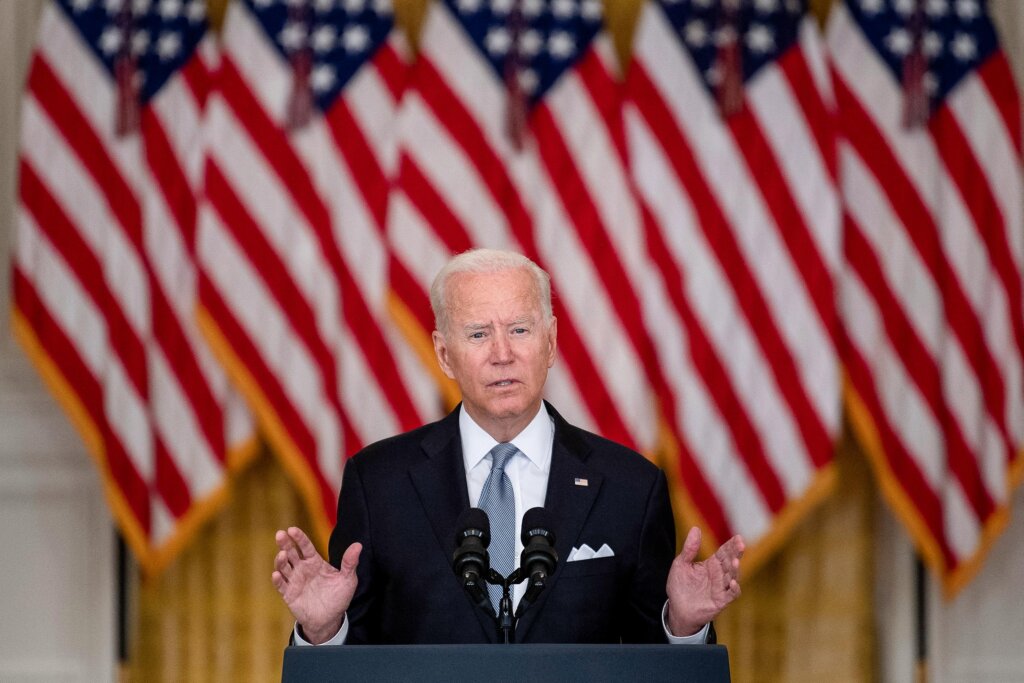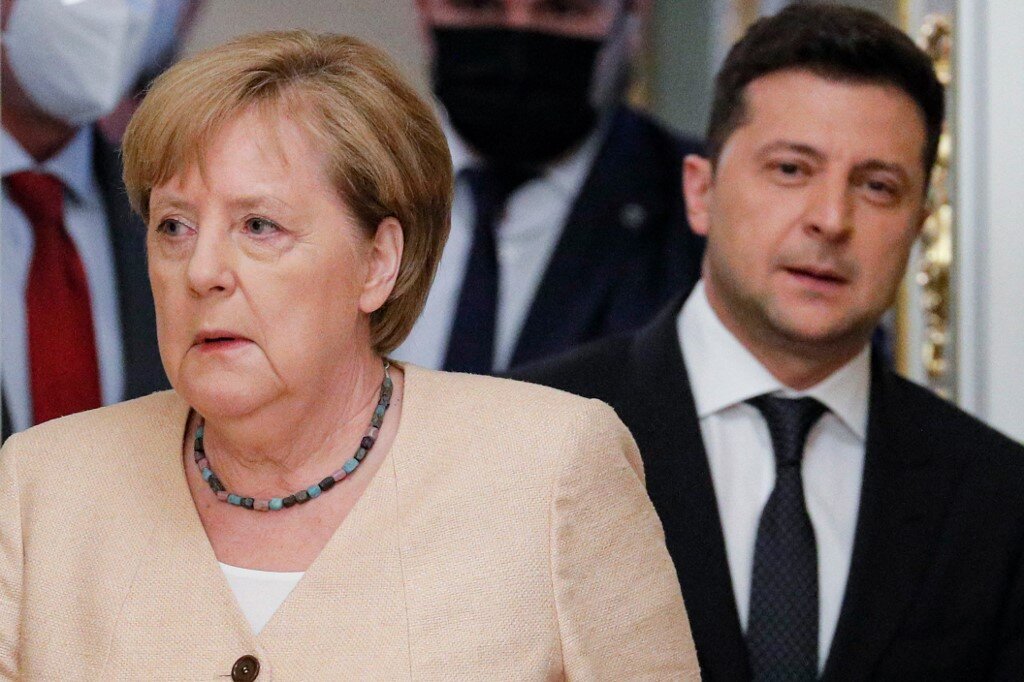President Volodymyr Zelensky’s Aug. 31 visit to the White House will not be easy.
His first face-to-face meeting with U. S. President Joseph Biden coincides with the fumbled U.S. withdrawal from Afghanistan and the pending completion of the Russian-German Nord Stream 2 pipeline that will shrink Ukraine’s leverage and cost it at least $1.2 billion per year in lost gas-transit revenue from Russia.
Zelensky, whom Biden has kept at arm’s length, must make the most of his time in Washington.
The upcoming negotiations will center on arms supplies, U.S. financial support, energy and Ukraine’s progress in fighting corruption and establishing rule of law. Biden has already complained about the lack of reforms, when asked about Ukraine’s prospects for joining the NATO military alliance. He said on June 14, 2021, “the fact is, they still have to clean up corruption.”
Since late March, Russia has been massing troops and rattling sabers near Ukraine’s borders, while Kremlin dictator Vladimir Putin routinely denigrates the idea that Ukraine is a real nation. Ukraine’s top officials have called for more U.S. military aid to defend against Russia’s war, now in its eighth year.
On Aug. 22, Zelensky said that U.S. naval assistance will be one of the key topics of his talks with Biden as Ukraine seeks to rebuild its Black Sea fleet.
Energy security is also on the list. Biden greenlighted the completion of the Nord Stream 2 pipeline by not sanctioning the main companies involved in the construction of the 1,230-kilometer pipeline. In doing so, the administration effectively chose Germany over Ukraine as its priority.
Zelensky wants to negotiate a “compensation package” for his country.
“I want to understand what guarantees Ukraine will have and who is giving them,” Zelensky said after his meeting with German Chancellor Angela Merkel on Aug. 22 in Kyiv.
The Ukrainian president has also been vocal about his desire to receive a NATO Membership Action Plan (MAP) and to see more sanctions imposed on Russia.
Yet, Zelensky’s wish list is too long, experts say.
“If he wants to return home with a clear success and having boosted U.S.-Ukraine relations, he should not ask for things he knows — or should know — he cannot get,” wrote Steven Pifer, former U. S. Ambassador to Ukraine, in an opinion piece for the Kyiv Post.
Tough times
Zelensky’s visit to the U.S. is coming at a bad time.
After seven months in the White House, Biden has racked up numerous important failures, some of which directly involve Ukraine.
“Ukraine, at large, became a hostage of U.S. internal politics,” says Oleksandr Kraiev, researcher of North American politics at the Kyiv-based Ukrainian Prism think tank.
In April, Biden was on the rise. Fresh off an electoral victory, the president imposed a new round of sanctions on Russia, promised Ukraine unwavering support amid an ongoing Russian military escalation and pushed for the withdrawal of U.S. troops from Afghanistan after 20 years by Sept. 11.
Soon, U.S. foreign policy did a U-turn.
In May, Biden decided to ease sanctions imposed on the Nord Stream 2 pipeline, Russia’s $11 billion mega-project set to transport gas from Russia to Germany bypassing Ukraine.
Biden said the project was nearly done and he wanted to boost relations with Germany, a key ally in Europe.
“You can’t pretend to be a Russia hawk but then just roll over,” said Republican Senator Ben Sasse as a response to this decision.
Democratic Senator Robert Menendez, head of the foreign relations committee, said that the move “created uncertainty in many corners of Europe.”
In July, Biden went further, striking a deal with Germany to allow the Nord Stream 2 pipeline to be finished in 2021.
“This commitment is designed to ensure that Russia will not misuse any pipeline, including Nord Stream 2, to achieve aggressive political ends by using energy as a weapon,” according to a joint U.S-German statement.
Soon, Russia began doing just that, threatening to cut Ukraine off Russian gas.
Ukraine wasn’t the only country caught in the crossfire of U.S. foreign policy setbacks.
The unfolding crisis in Afghanistan is likely to occupy most of the Biden administration’s attention.

U.S. President Joe Biden speaks about the Taliban’s takeover of Afghanistan at the White House on Aug. 16, 2021. The Taliban, an armed radical Islamist group, recaptured Kabul a day earlier after being routed at the start of the U.S. war in 2001. (AFP)
“The likelihood there’s going to be the Taliban overrunning everything and owning the whole country is highly unlikely,” said Biden on July 8 as the U.S. was preparing to withdraw from Afghanistan.
By Aug. 15, the Taliban seized Afghanistan without a fight.
Entire foreign embassies had to flee to the airport. Thousands of Afghans were scrambling to get out of a country overrun by a movement known for a radical interpretation of Islam and public executions.
“We decided to engage in nation-building, that never made any sense to me,” Biden said on Aug. 16, defending his decision to abruptly end the $2 trillion war.
On the same day, at least 12 Afghans died at the airport trying to flee the country, some by way of grabbing the landing gear of the departing American planes.
“This is not as much the Kabul downfall as this horrific scene of panic and despair at the Kabul airport that will turn a severe reputation loss of the U.S. and specifically Biden,” said Iliya Kusa, an international relations expert with the Ukrainian Institute for the Future.
Zelensky’s pitch
As Zelensky arrives in Washington to revive stagnant U.S.-Ukraine relations, he’ll have no backing on Capitol Hill as Congress is taking its scheduled August recess.
The main questions that cause friction between Ukraine and its allies are energy security and potential NATO membership. Both are a hard sell for Zelensky.
Biden’s Nord Stream 2 deal with German Chancellor Angela Merkel offered a so-called Green Fund, to which Germany has committed $175 million to promote and support investments in green energy in Ukraine. Germany stated that it hopes to attract $1 billion from third-party backers, including private investors to help Ukraine achieve energy independence.
Germany will also provide $70 million of funding to support Ukraine’s energy security.
“It is up to Ukraine to fill in the blanks to make this offer as concrete and meaningful as possible,” wrote energy expert Edward Chow, a senior associate at the Center for Strategic and International Studies.
Meanwhile, Ukraine’s green energy market is stuck trying to decide what to do about unsustainably high feed-in tariffs that caused the state to build up over $700 million in debts to renewable energy producers, many of which are foreign companies.
According to political observers, Washington won’t give Ukraine a NATO MAP either. “Zelensky should not seek a MAP,” wrote Pifer.
Ukraine has the best chances to secure more weapons.
President Zelensky has been vocal about his desire to receive military equipment and naval vehicles from the U.S. During his Aug. 22 meeting with Merkel, the Ukrainian president said that the country requires a proper fleet to stand against Russia’s military presence in the Sea of Azov and the Black Sea.

German Chancellor Angela Merkel and President Volodymyr Zelensky arrive for a joint news conference following their talks at Mariyinsky Palace in Kyiv on Aug. 22, 2021. (AFP)
“I am going to discuss this issue with Biden on Aug. 31,” said Zelensky. “Ukraine expects sniper rifles and many more things, besides the fleet and military boats, which we would like to receive from our partners.”
In July 2020, the U.S. greenlighted the sale of 16 Mark VI patrol boats and other equipment, to Ukraine as part of a $600 million contract. Part of the contract was covered by the U. S. Department of State’s Foreign Military Financing program.
Economic cooperation is another area of interest for Ukraine.
“There is no secret that we want to see more American money in the Ukrainian economy. Especially in the strategic sectors of our economy,” Foreign Minister Dmytro Kuleba said on Aug. 9. “We can build a very effective partnership with American business and American financial institutions.”
Ukraine already received $250 million from the U.S in 2021.
Washington’s instructions
Yet Ukraine’s wants will come with a price tag attached. According to U.S. officials, the price is the same it’s been for years: successful reforms.
“There’s clearly a need for more progress on things like corporate governance, on judicial reform, on making sure that the anti-corruption bureau is truly independent,” said U. S. Secretary of State Antony Blinken during his May visit to Kyiv.
Blinken was more straightforward and instructive in a video address that was shown at the Ukraine Reform Conference in Lithuania in June. He laid out five key tasks for the Ukrainian government, such as reforming the Security Service, ensuring a transparent selection of top anti-corruption officials, proceeding with judicial reform and holding corrupt officials accountable.
The tone of the address has reportedly irked top people in Zelensky’s administration.
Shortly after, when Deputy Assistant Secretary George Kent spent two weeks in Kyiv replacing Charge d’Affaires Kristina Kvien, he didn’t have a public meeting with either the president or the administration’s leadership.
Out of the to-do list that Blinken provided in June, Ukrainian leadership has made progress only on one account: It passed the necessary legislation for the judicial reform.
On July 14, the parliament gave foreign experts a decisive role in reforming the High Council of Justice, the judiciary’s main governing body.
Yet other tasks from Blinken’s list are far from completion. Ukraine still lacks a leader for its State Investigative Bureau and Special Anti-Corruption Prosecutor’s Office. Both seats have been vacant for over a year.
Ukraine’s National Anti-Corruption Bureau head Artem Sytnyk may even be ousted by Zelensky’s party.
Kraiev hopes Zelensky’s team has a roadmap of reforms that can be presented to Biden during the meeting.
“I hope Zelensky is set to achieve concrete results during this meeting and not meet only for the sake of the meeting to happen,” says Kraiev.
